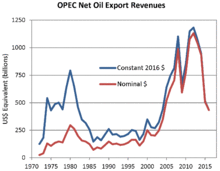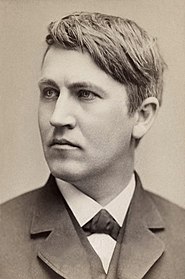Portal:Energy
| Main page | New articles & Tasks |
 The Energy Portal Welcome to Wikipedia's Energy portal, your gateway to energy. This portal is aimed at giving you access to all energy related topics in all of its forms.
|
Page contents: Selected article • Selected image • Selected biography • Did you know? • General images • Quotations • Related portals • Wikiprojects • Major topics • Categories • Help • Associated Wikimedia |
Introduction
Energy (from Ancient Greek ἐνέργεια (enérgeia) 'activity') is the quantitative property that is transferred to a body or to a physical system, recognizable in the performance of work and in the form of heat and light. Energy is a conserved quantity—the law of conservation of energy states that energy can be converted in form, but not created or destroyed. The unit of measurement for energy in the International System of Units (SI) is the joule (J).
Forms of energy include the kinetic energy of a moving object, the potential energy stored by an object (for instance due to its position in a field), the elastic energy stored in a solid object, chemical energy associated with chemical reactions, the radiant energy carried by electromagnetic radiation, the internal energy contained within a thermodynamic system, and rest energy associated with an object's rest mass. These are not mutually exclusive.
All living organisms constantly take in and release energy. The Earth's climate and ecosystems processes are driven primarily by radiant energy from the sun. The energy industry provides the energy required for human civilization to function, which it obtains from energy resources such as fossil fuels, nuclear fuel, and renewable energy. (Full article...)
Selected article

Petrodollar recycling is the international spending or investment of a country's revenues from petroleum exports ("petrodollars"). It generally refers to the phenomenon of major petroleum-exporting states, mainly the OPEC members plus Russia and Norway, earning more money from the export of crude oil than they could efficiently invest in their own economies. The resulting global interdependencies and financial flows, from oil producers back to oil consumers, can reach a scale of hundreds of billions of U.S. dollars per year – including a wide range of transactions in a variety of currencies, some pegged to the U.S. dollar and some not. These flows are heavily influenced by government-level decisions regarding international investment and aid, with important consequences for both global finance and petroleum politics. The phenomenon is most pronounced during periods when the price of oil is historically high.
The term petrodollar was coined in the early 1970s during the oil crisis, and the first major petrodollar surge (1974–1981) resulted in more financial complications than the second (2005–2014). (Full article...)
Selected image

Photo credit: Senior Airman Joshua Strang, United States Air Force
An aurora, caused by the release of energy as charged particles collide with atoms in the Earth's upper atmosphere.
Did you know?
- The Obninsk Nuclear Power Plant was the world's first civilian nuclear power plant while Sellafield (pictured) was the world's first commercial nuclear power station?
- The Chinese energy company Fushun Mining Group operates the largest oil shale plant in the world consisting 220 Fushun-type retorts?
- Three of the four largest power stations in the world are in South America?
- Adriatic LNG is the world's first offshore gravity-based structure LNG regasification terminal?
- The Horse Hollow Wind Energy Center is the world's largest wind farm at 735.5 megawatt?
- Scotland has 85% of the United Kingdom's hydro-electric energy resource?
- The day when Exxon canceled its Colony Shale Oil Project in Colorado is known by locals as "Black Sunday"?
- The Australian energy company Linc Energy is the first company in the world to produce synthetic fuel by combining underground coal gasification and gas-to-liquid technologies?
Selected biography
Edison invented the first commercially practical electric light bulb which, by 1879 would burn for hundreds of hours. He was able to sell the concept to homes and businesses by mass-producing them and creating a complete system for the generation and distribution of electricity.
Edison patented an electric distribution system in 1880, and in January 1882 he switched on the first steam generating power station at Holborn Viaduct in London, UK. The direct current (DC) supply system provided electricity supplies to street lamps and a number of private dwellings within a short distance of the station. The first investor-owned electric utility, Pearl Street Station, New York City, started generating on September 4, 1882, providing 110 volts direct current to 59 customers in lower Manhattan.
Life magazine (USA), in a special double issue, placed Edison first in the list of the "100 Most Important People in the Last 1000 Years," noting that the light bulb he promoted "lit up the world." He was ranked thirty-fifth on Michael H. Hart's list of the most influential figures in history.
In the news
- 30 January 2025 –
- Following weeks of unsuccessful negotiations, the Centre Party withdraws from the Norwegian government over disagreements over the implementation of three directives in the European Union's fourth energy package, with the Labour Party continuing as a single party minority government. (NRK)
- 19 January 2025 –
- The Washington Post reports that there is an "emerging consensus" among U.S. and European intelligence officials that maritime accidents, rather than Russian sabotage, was the cause of damage to Baltic seabed energy and communications lines. (Washington Post)
- 17 January 2025 – Iran–Russia relations
- Iranian president Masoud Pezeshkian and Russian president Vladimir Putin sign the Iranian–Russian Treaty on Comprehensive Strategic Partnership. The 20-year deal will see cooperation between the two countries in multiple areas, including nuclear energy, counterterrorism, and environmental issues. (Middle East Eye)
- 15 January 2025 – Russian invasion of Ukraine
- Russia launches a major ballistic and cruise missile attack on regions across Ukraine, targeting energy production and compelling authorities to shut down the power grid. (AP)
- 14 January 2025 – 2024 Baltic Sea submarine cable disruptions, NATO operations
- At the Summit of Baltic Sea Allies in Helsinki, Finland, NATO Secretary General Mark Rutte announces the establishment of the Baltic Sentry military mission, which will strengthen the protection of critical infrastructure in the region, such as energy and communication cables, from "destabilizing acts". (NATO News)
General images
Quotations
- "Our children will enjoy in their homes electrical energy too cheap to meter." – Lewis Lichtenstein Strauss, 1954
- "There is every possibility that you will soon be able to tax it." – Michael Faraday, talking to William Gladstone on the future purpose of electricity.
- "Higher energy prices act like a tax. They reduce the disposable income people have available for other things after they've paid their energy bills." – John W. Snow, 2005
- "Our dependence on foreign energy is like a foreign tax on the American people." – George W. Bush, 2005
Related portals
WikiProjects
WikiProjects connected with energy:
Other WikiProjects that may be of interest:
Major topics
Major categories
National energy supply, use & conservation
National electricity sector
Politics, economics, environment
- Climate change
- Energy conservation
- Energy economics
- Energy crises
- Energy development
- Energy policy
- Peak oil
Energy sources
- Fuels
- Biofuels
- Fossil fuels
- Fusion power
- Nuclear technology
- Renewable energy
- Energy conversion
- Electric power
- Energy storage
Energy-related design
Scientific usage
Help

Puzzled by energy?
Can't answer your question?
Don't understand the answer?
- Ask at the reference desk
- Read the Wikipedia help pages
For further ideas, to leave a comment, or to learn how you can help improve and update this portal, see the talk page.
Associated Wikimedia
The following Wikimedia Foundation sister projects provide more on this subject:
-
Commons
Free media repository -
Wikibooks
Free textbooks and manuals -
Wikidata
Free knowledge base -
Wikinews
Free-content news -
Wikiquote
Collection of quotations -
Wikisource
Free-content library -
Wikiversity
Free learning tools -
Wiktionary
Dictionary and thesaurus

























































































































































































